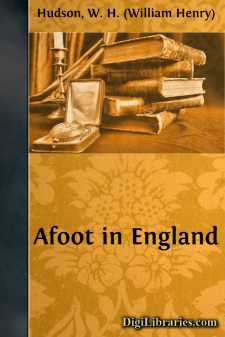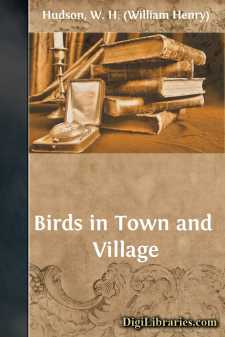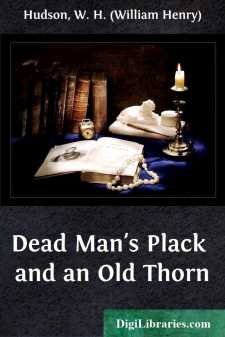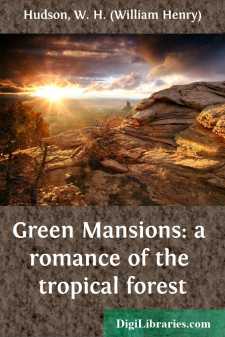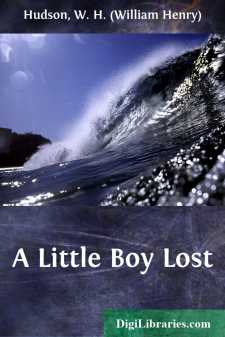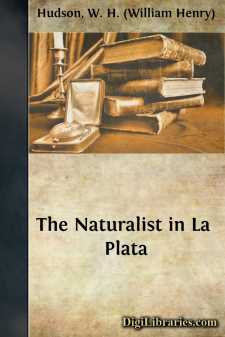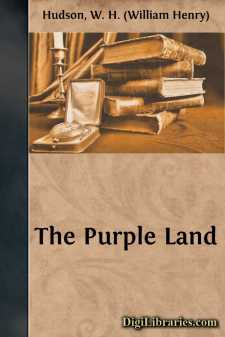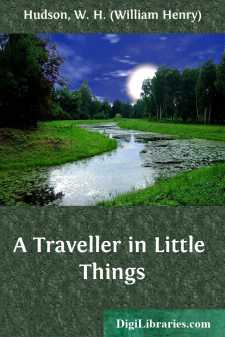Categories
- Antiques & Collectibles 13
- Architecture 36
- Art 48
- Bibles 22
- Biography & Autobiography 813
- Body, Mind & Spirit 142
- Business & Economics 28
- Children's Books 17
- Children's Fiction 14
- Computers 4
- Cooking 94
- Crafts & Hobbies 4
- Drama 346
- Education 46
- Family & Relationships 57
- Fiction 11829
- Games 19
- Gardening 17
- Health & Fitness 34
- History 1377
- House & Home 1
- Humor 147
- Juvenile Fiction 1873
- Juvenile Nonfiction 202
- Language Arts & Disciplines 88
- Law 16
- Literary Collections 686
- Literary Criticism 179
- Mathematics 13
- Medical 41
- Music 40
- Nature 179
- Non-Classifiable 1768
- Performing Arts 7
- Periodicals 1453
- Philosophy 64
- Photography 2
- Poetry 896
- Political Science 203
- Psychology 42
- Reference 154
- Religion 513
- Science 126
- Self-Help 84
- Social Science 81
- Sports & Recreation 34
- Study Aids 3
- Technology & Engineering 59
- Transportation 23
- Travel 463
- True Crime 29
W. H. (William Henry) Hudson
William Henry Hudson (1841–1922) was an Argentine-British naturalist, ornithologist, and writer known for his books about the natural world and his vivid descriptions of South American landscapes. He authored notable works such as "Green Mansions" and "Far Away and Long Ago," blending his scientific observations with poetic prose. Hudson's writing significantly influenced the early conservation movement and remains celebrated for its contribution to nature literature.
Author's Books:
Sort by:
CHAPTER I EARLIEST MEMORIES Preamble—The house where I was born—The singular Ombu tree—A tree without a name—The plain—The ghost of a murdered slave—Our playmate, the old sheep-dog—A first riding-lesson—The cattle: an evening scene—My mother—Captain Scott—The hermit and his awful penance. It was never my intention to write an autobiography. Since I took to writing in my middle...
more...
Chapter One: Guide-Books: An Introduction Guide-books are so many that it seems probable we have more than any other country—possibly more than all the rest of the universe together. Every county has a little library of its own—guides to its towns, churches, abbeys, castles, rivers, mountains; finally, to the county as a whole. They are of all prices and all sizes, from the diminutive paper-covered...
more...
BIRDS IN A VILLAGE I About the middle of last May, after a rough and cold period, there came a spell of brilliant weather, reviving in me the old spring feeling, the passion for wild nature, the desire for the companionship of birds; and I betook myself to St. James's Park for the sake of such satisfaction as may be had from watching and feeding the fowls, wild and semi-wild, found gathered at...
more...
CHAPTER I A Misty evening in mid-October; a top room in one of the small dingy houses on the north side of Moon Street, its floor partially covered with pieces of drugget carpet trodden into rags; for furniture, an iron bed placed against the wall, a deal cupboard or wardrobe, a broken iron cot in a corner, a wooden box and three or four chairs, and a small square deal table; on the table one candle in...
more...
"The insect tribes of human kind" is a mode of expression we are familiar with in the poets, moralists and other superior persons, or beings, who viewing mankind from their own vast elevation see us all more or less of one size and very, very small. No doubt the comparison dates back to early, probably Pliocene, times, when some one climbed to the summit of a very tall cliff, and looking down...
more...
FOREWORD I take up pen for this foreword with the fear of one who knows that he cannot do justice to his subject, and the trembling of one who would not, for a good deal, set down words unpleasing to the eye of him who wrote Green Mansions, The Purple Land, and all those other books which have meant so much to me. For of all living authors—now that Tolstoi has gone I could least dispense with W. H....
more...
CHAPTER I THE HOME ON THE GREAT PLAIN Some like to be one thing, some another. There is so much to be done, so many different things to do, so many trades! Shepherds, soldiers, sailors, ploughmen, cartersвÐâone could go on all day naming without getting to the end of them. For myself, boy and man, I have been many things, working for a living, and sometimes doing things just for pleasure;...
more...
CHAPTER I. THE DESERT PAMPAS. During recent years we have heard much about the great and rapid changes now going on in the plants and animals of all the temperate regions of the globe colonized by Europeans. These changes, if taken merely as evidence of material progress, must be a matter of rejoicing to those who are satisfied, and more than satisfied, with our system of civilization, or method of...
more...
CHAPTER I Three chapters in the story of my life—three periods, distinct and well defined, yet consecutive—beginning when I had not completed twenty-five years and finishing before thirty, will probably prove the most eventful of all. To the very end they will come back oftenest to memory and seem more vivid than all the other years of existence—the four-and-twenty I had already lived, and the,...
more...
I HOW I FOUND MY TITLE It is surely a rare experience for an unclassified man, past middle age, to hear himself accurately and aptly described for the first time in his life by a perfect stranger! This thing happened to me at Bristol, some time ago, in the way I am about to relate. I slept at a Commercial Hotel, and early next morning was joined in the big empty coffee-room, smelling of stale tobacco,...
more...



